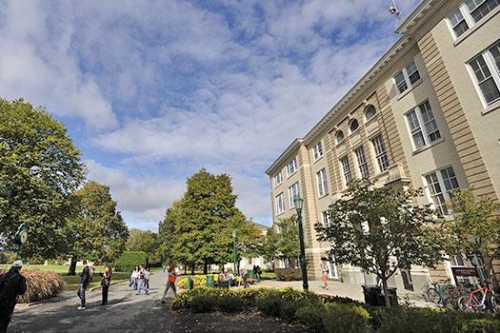You have your visa. You have arranged your travel. Now it’s time to prepare for your stay at Union College.
What to bring
Documents for U.S. Port of Entry
The Customs and Border Protection officers will ask you to show the following upon your arrival to the U.S.:
- Passport (or proof of Canadian citizenship for Canadian citizens)
- Receipt of SEVIS fee payment
- I-20 or DS-2019 form (Certificate of Eligibility)
- Union College admissions letter
- Financial documentation corresponding with your I-20 or DS-2019 form
Do not attempt to enter the U.S. on either another school's I-20 or DS-2019 (considered a fraudulent entry) or on a visitor/tourist visa (B-2). The Department of Homeland Security will rarely authorize a change of status from B-2 to F-1 or J-1.
Climate and clothing
The weather in Schenectady varies widely with the four seasons.
- Fall/Spring: medium-weight wool coats or jackets and a raincoat/umbrella
20 to 80 degrees Fahrenheit (-7 to 26 degrees centigrade) - Winter: heavy jackets or overcoats, hats, scarves, gloves and boots
0 to 45 degrees Fahrenheit (-18 to 7 degrees centigrade) - Late spring (June): you may need a lightweight jacket for a cool evening
Money
You should plan to bring approximately $100 in cash for emergencies, meals and necessities while traveling. Once on campus, classroom supplies and personal items can be purchased at the College Bookstore. You will also have the opportunity to shop at local stores soon after your arrival.
Textbooks will cost approximately $500 per term and should be purchased during the first week of the term.
Linens
Exchange students and teaching assistants are provided bed linens by the College. All others must provide twin extra-long fitted and flat sheets, pillow and pillowcase.
Personal Items
Each year the College hosts an international festival that allows our international students to present the various cultural traditions of their home country to the campus community. Many students like to bring traditional items to share.
You may also want to bring items that you use regularly but may not be readily available or too expensive to repurchase, such as cameras, eyeglasses, laptop, watches or portable radios.
Remember that electrical appliances manufactured outside the U.S. may not be compatible with the power supply and may be banned in the residence halls.
What NOT to bring
Certain items are prohibited from entering the U.S. A booklet on customs regulations can be obtained at the consulate or embassy where your acquired your visa.
You do not need to bring any textbooks used in previous study.

Reamer Campus Center 303
View in Google Maps